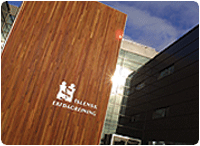The nation with the glassy genes

The genotype of the human being has been decoded. Now scientists are looking for agents with which genetically conditioned diseases can be cured. Therefore special biological banks are needed in which genetical information and datas of health are linked. Iceland is the first country to have set up one.
Although the human genotype has been decoded, we do not yet fully understand the biological structure of the human being. Indeed we possess less genes than expected but the interactions are more complicated. Now the really tough part begins: namely to distinguish the genetical differences between the individual humans to estimate the risk factor which lead to diseases. But the acutal goal is still a big step further, namely to find new agents against diseases that have not been cureable untill now - here many pharmaceutical companies scent the big business (Novartis and Roche are investing heavily into this!) For this complex mission a biological bank is needed with preferably a complete system of health data from the majority of the population and also as many blood samples. Iceland was the first country to establish this!
A long path
Also in this business, rapidness is needed, but the Icelandic collection of blood samples only coveres a few thousand pieces. The exact number is a corporate secret of DeCode Genetics (www.decode.is), but they are still far away from the possibility to look at the genotypes of all Icelanders.

A had full of vikings
The fact that Iceland was the first country to establish a biological bank is quite simple: The Icelandic people are a young nation. Only about 1000 years ago the first vikings came from Norway to settle the island in the north Atlantic. It was only a hand full of people that landed at that time and as there was practically no further immigration, the 300'000 inhabitants that live on the island now principally have to be all related to each other. For scientists this would be the ideal population to look for congenital diseases. This was Kari Stefánsson's theory, professor of medicine, when he founded his company deCode genetics in Reykjavik. Also the Swiss pharmacologist Hoffmann - La Roche was so enthusiastic about this idea that in 1997 he invested a large amount of money for a collaboration.
Thrilled genealogists
Meanwhile there have been surprising results, because the Icelandic population is not as homogeneous as expected. On their way to Iceland the vikings apparently stopped first in Scottland and Ireland to rob some women, which are responsible for the Celtic line in the blood. The Icelanders have always been keen scientists about their ancestors. This interest has been part of Iceland over centuries. Already the first settlers started to document in the Landnámabók all the family relations from the beginning on.
Privacy in danger
For over 100 years Icelandic doctors have collected disease records, which together with the genealogy have shown the interaction of environmental impact with predisposition at the emergence of diseases. Sine qua non was a law from 1998 that allows the collection of all the health data of the living and dead Icelanders in a central databank. The concession for setup and use went for the period of 12 years to deCode genetics.


0 Comments:
Post a Comment
<< Home